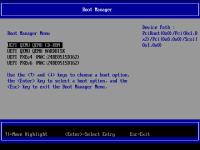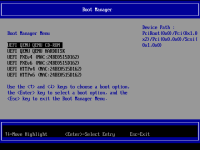-
Bug
-
Resolution: Done-Errata
-
Blocker
-
rhel-8.10.z, rhel-9.2.0.z, rhel-9.4.z
-
edk2-20231122-6.el9_4.3
-
Yes
-
None
-
ZStream
-
rhel-virt-confidential-firmware
-
ssg_virtualization
-
5
-
False
-
False
-
-
None
-
None
-
Approved Blocker
-
Pass
-
Manual
-
-
x86_64
-
None
What were you trying to do that didn't work?
no "UEFI HTTPv4" and "UEFI HTTPv6" boot entrance under the boot manager menu.
Enable http boot with the following libvirt network configureation and grub.cfg.
And start installation with virt-install command "sudo virt-install --name=bootc-rhel-9-4-uefi --disk path=/var/lib/libvirt/images/bootc-rhel-9-4-uefi.qcow2,format=qcow2 --ram 3072 --vcpus 2 --network network=integration,mac=34:49:22:B0:83:30 --boot uefi --pxe --os-variant rhel9-unknown --console file,source.path=/tmp/rhel-9-4-uefi-lvm-console.log --nographics --noautoconsole --wait --noreboot"
No ">>Start HTTP Boot over IPv4.... Station IP address is 192.168.100.50" in the console and report "BdsDxe: No bootable option or device was found." error.
Do not have this issue on "libvirt-10.0.0-6.el9_4.x86_64" but found this issue on "libvirt-10.0.0-6.4.el9_4.x86_64"
>>Start PXE over IPv4. PXE-E16: No valid offer received. BdsDxe: failed to load Boot0002 "UEFI PXEv4 (MAC:344922B08330)" from PciRoot(0x0)/Pci(0x1,0x0)/Pci(0x0,0x0)/MAC(344922B08330,0x1)/IPv4(0.0.0.0,0x0,DHCP,0.0.0.0,0.0.0.0,0.0.0.0): Not Found>>Start PXE over IPv6. PXE-E16: No valid offer received. BdsDxe: failed to load Boot0003 "UEFI PXEv6 (MAC:344922B08330)" from PciRoot(0x0)/Pci(0x1,0x0)/Pci(0x0,0x0)/MAC(344922B08330,0x1)/IPv6(0000:0000:0000:0000:0000:0000:0000:0000,0x0,Static,0000:0000:0000:0000:0000:0000:0000:0000,0x40,0000:0000:0000:0000:0000:0000:0000:0000): Not Found BdsDxe: failed to load Boot0001 "UEFI Misc Device" from PciRoot(0x0)/Pci(0x1,0x3)/Pci(0x0,0x0): Not Found BdsDxe: No bootable option or device was found. BdsDxe: Press any key to enter the Boot Manager Menu.
# virsh net-dumpxml integration <network xmlns:dnsmasq='http://libvirt.org/schemas/network/dnsmasq/1.0' connections='1'> <name>integration</name> <uuid>1c8fe98c-b53a-4ca4-bbdb-deb0f26b3579</uuid> <forward mode='nat'> <nat> <port start='1024' end='65535'/> </nat> </forward> <bridge name='integration' zone='trusted' stp='on' delay='0'/> <mac address='52:54:00:36:46:ef'/> <ip address='192.168.100.1' netmask='255.255.255.0'> <dhcp> <range start='192.168.100.2' end='192.168.100.254'/> <host mac='34:49:22:B0:83:30' name='vm-1' ip='192.168.100.50'/> <host mac='34:49:22:B0:83:31' name='vm-2' ip='192.168.100.51'/> <host mac='34:49:22:B0:83:32' name='vm-3' ip='192.168.100.52'/> </dhcp> </ip> <dnsmasq:options> <dnsmasq:option value='dhcp-vendorclass=set:efi-http,HTTPClient:Arch:00016'/> <dnsmasq:option value='dhcp-option-force=tag:efi-http,60,HTTPClient'/> <dnsmasq:option value='dhcp-boot=tag:efi-http,"http://192.168.100.1/httpboot/EFI/BOOT/BOOTX64.EFI"'/> </dnsmasq:options> </network>
# cat /var/www/html/httpboot/EFI/BOOT/grub.cfg set default="3"function load_video { insmod efi_gop insmod efi_uga insmod video_bochs insmod video_cirrus insmod all_video }load_video set gfxpayload=keep insmod gzio insmod part_gpt insmod ext2set timeout=10 ### END /etc/grub.d/00_header ###search --no-floppy --set=root -l 'RHEL-9-4-0-BaseOS-x86_64'### BEGIN /etc/grub.d/10_linux ### menuentry 'Install Red Hat Enterprise Linux 9.4' --class fedora --class gnu-linux --class gnu --class os { linuxefi /images/pxeboot/vmlinuz inst.stage2=hd:LABEL=RHEL-9-4-0-BaseOS-x86_64 quiet initrdefi /images/pxeboot/initrd.img } menuentry 'Test this media & install Red Hat Enterprise Linux 9.4' --class fedora --class gnu-linux --class gnu --class os { linuxefi /images/pxeboot/vmlinuz inst.stage2=hd:LABEL=RHEL-9-4-0-BaseOS-x86_64 rd.live.check quiet initrdefi /images/pxeboot/initrd.img } submenu 'Troubleshooting -->' { menuentry 'Install Red Hat Enterprise Linux 9.4 in text mode' --class fedora --class gnu-linux --class gnu --class os { linuxefi /images/pxeboot/vmlinuz inst.stage2=hd:LABEL=RHEL-9-4-0-BaseOS-x86_64 inst.text quiet initrdefi /images/pxeboot/initrd.img } menuentry 'Rescue a Red Hat Enterprise Linux system' --class fedora --class gnu-linux --class gnu --class os { linuxefi /images/pxeboot/vmlinuz inst.stage2=hd:LABEL=RHEL-9-4-0-BaseOS-x86_64 inst.rescue quiet initrdefi /images/pxeboot/initrd.img } } menuentry 'Install Red Hat Enterprise Linux for Bootc' --class fedora --class gnu-linux --class gnu --class os { linuxefi /httpboot/images/pxeboot/vmlinuz inst.stage2=http://192.168.100.1/httpboot inst.ks=http://192.168.100.1/ks.cfg inst.text console=ttyS0,115200 initrdefi /httpboot/images/pxeboot/initrd.img }
Please provide the package NVR for which bug is seen:
libvirt-10.0.0-6.4.el9_4.x86_64
How reproducible:
Steps to reproduce
- configure libvirt network to support http boot, xml file can be found above.
- download EFI and images folder from internal repo into /var/www/html/httpboot/
- change /var/www/html/httpboot/EFI/BOOT/grub.cfg. The content can be found above.
- sudo virt-install --name=bootc-rhel-9-4-uefi --disk path=/var/lib/libvirt/images/bootc-rhel-9-4-uefi.qcow2,format=qcow2 --ram 3072 --vcpus 2 --network network=integration,mac=34:49:22:B0:83:30 --boot uefi --pxe --os-variant rhel9-unknown --console file,source.path=/tmp/rhel-9-4-uefi-lvm-console.log --nographics --noautoconsole --wait --noreboot
Expected results
Start http boot with log:
>>Start HTTP Boot over IPv4.... Station IP address is 192.168.100.50 URI: http://192.168.100.1/httpboot/EFI/BOOT/BOOTX64.EFI File Size: 959848 Bytes
Actual results
Not start http boot but with error:
BdsDxe: No bootable option or device was found. BdsDxe: Press any key to enter the Boot Manager Menu.
- links to
-
 RHBA-2024:137762
edk2 update
RHBA-2024:137762
edk2 update

